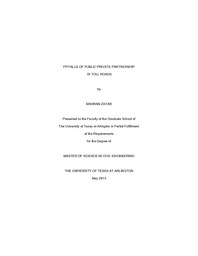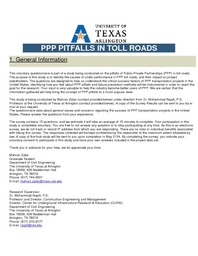
ATTENTION: The works hosted here are being migrated to a new repository that will consolidate resources, improve discoverability, and better show UTA's research impact on the global community. We will update authors as the migration progresses. Please see MavMatrix for more information.
Show simple item record
| dc.contributor.author | Zatar, Mahran Maher | en_US |
| dc.date.accessioned | 2014-07-14T20:27:34Z | |
| dc.date.available | 2014-07-14T20:27:34Z | |
| dc.date.issued | 2014-07-14 | |
| dc.date.submitted | January 2014 | en_US |
| dc.identifier.other | DISS-12617 | en_US |
| dc.identifier.uri | http://hdl.handle.net/10106/24447 | |
| dc.description.abstract | Public-Private Partnership (PPP) has been one of the most effective concepts in developing infrastructure projects. By bringing in creative skills and management efficiency from business practice, private companies can potentially improve efficiency and productivity in implementation of major capital projects and provide an effective approach to meet project objectives. The main idea behind the partnership in toll roads delivery is putting together the strengths of both public and private sectors in order to provide services in the most cost-effective manner, on time, and with the highest quality. However, the criteria on which governments judge the "success" of PPP projects is still considered ambiguous. Having multiple goals, PPPs make it very hard and complicated to decide whether the project is a success or a failure. To highlight the underperformance that happen in PPP toll roads, two case studies, and a survey were conducted. The findings in this thesis show that PPP projects are believed to limit government's flexibility, as it will be very hard for the government to change their funding allocation to reflect new priorities after the contract had been signed.In addition, the thesis shows that inappropriate sharing of risk could lead to serious problems in PPP toll roads. Therefore, much emphasis is placed on having a solid legal framework at the beginning of the project. Allocating the risks to the party best able to deal with them is the main concept behind managing high risk projects.The length of the contract period is considered one of the main factors that affect the success of PPP toll roads. It is concluded that contract periods over 75 years will lead to problems like roads life depreciation, causing underperformance in PPP toll roads. Moreover, inadequate or non-existent feasibility studies that include unrealistic traffic and revenue forecasts are the main causes of underperformance in PPP toll roads. | en_US |
| dc.description.sponsorship | Najafi, Mohammad | en_US |
| dc.language.iso | en | en_US |
| dc.publisher | Civil & Environmental Engineering | en_US |
| dc.title | Public Private Partnership Pitfalls In Toll Roads | en_US |
| dc.type | M.S. | en_US |
| dc.contributor.committeeChair | Najafi, Mohammad | en_US |
| dc.degree.department | Civil & Environmental Engineering | en_US |
| dc.degree.discipline | Civil & Environmental Engineering | en_US |
| dc.degree.grantor | University of Texas at Arlington | en_US |
| dc.degree.level | masters | en_US |
| dc.degree.name | M.S. | en_US |
Files in this item
- Name:
- Zatar_uta_2502M_12617.pdf
- Size:
- 647.1Kb
- Format:
- PDF
- Name:
- SurveyQuesttionaire-ZATAR.pdf
- Size:
- 43.04Kb
- Format:
- PDF
This item appears in the following Collection(s)
Show simple item record



